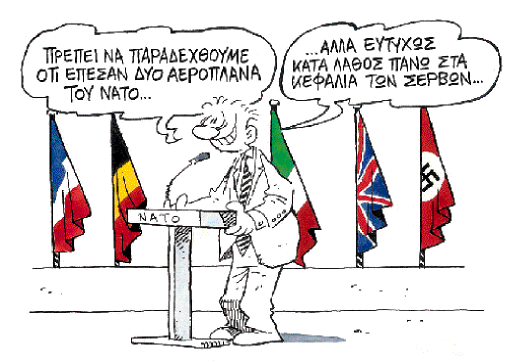

Nuovo ruolo della NATO: la posizione greca
SPEA - Arch.Alexis Kilismanis
Martedi`, 04 Maggio 1999 ore 12:38

Dalla Athens News Agency, le ultime notizie dalla Grecia, la foto a la
vignetta.
1) Nel corso dell'ultima seduta del parlamento greco, il primo ministro
Simitis espone la posizione greca sul conflitto in corso e la decisa
opposizione della grecia sul nuovo ruolo di gendarme mondiale della
NATO.
2) La manifestazione dei giornalisti greci in occasione della giornata
mondiale dell'informazione libera.
1) Simitis expands on Greek policy over Kosovo crisis, NATO
Prime Minister Costas Simitis told Parliament last night he had
another telephone conversation with German Chancellor Gerhard
Schroeder as part of efforts to find a solution to the protracted
Kosovo crisis.
He made the statement during the off-the-agenda debate in the
legislature focusing on NATO and the war in Yugoslavia, held at the
request of the Communist Party of Greece (KKE).
In his address, Mr. Simitis stressed that the legalising role of the
UN is essential in finding a solution to the Kosovo crisis, while any
solution to be provided must be within the framework of a unified
Yugoslavia in order to be viable.
Mr. Simitis said it was not necessary for the international force to
be deployed in the region to be a NATO force, while he indicated that
actions also being discussed within the framework of European Union
initiatives for a defusion of the crisis include a pullout of
Yugoslav troops from Kosovo, a safe return of refugees to their homes
and a simultaneous end to all acts of war.
Referring to Greece's position on the crisis, he said "our country's
position lives up to our values, the collective reactions of the
Greek people, as well as to the need for credibility towards other
peoples with which we cooperate."
The Greek PM questioned the correctness of the NATO bombings, saying
they produced no results and, more specifically, failed to prevent
ethnic cleansing, resulting in hundreds of thousands of refugees and
economic destabilisation of Albania as well as the Former Yugoslav
Republic of Macedonia (FYROM), among others. He also said the
bombings rallied the Serbian people behind Yugoslav President Slobodan
Milosevic.
On the question of NATO's new role, Mr. Simitis briefed Parliament
on discussions held during the three-day events marking the
alliance's 50th anniversary and on the new texts signed in
Washington.
He said Greece was not marginalised but, on the contrary, made its
double identity understood, as well as its sensitivity over problems
in the region.
He added that Greece is participating in NATO on an equal footing
for the first time.
Mr. Simitis, elaborating on NATO's new role, ascertained the strong
opposition of the Greek government to whatever efforts to have NATO
proclaimed a "international gendarme."
He also said NATO cannot act on the basis of its own principles,
independent from those established by the UN and cannot intervene
when it alone desires intervention.
The Greek PM said NATO's actions must have legal standing beyond any
doubt and that international law is the prerequisite for credibility
in all actions.
Referring to the alliance's new structure and the activation of
headquarters, Mr. Simitis said that all of NATO's headquarters
without exception, including that of Larisa, have been activated by
the decision taken by NATO's Council on March 1.
Mr. Simitis said that had the government adopted the positions of
opposition parties it would have created spectacular impressions for
a few hours but, in the long run, it would have created serious
problems which would have worsened the country's inter national
position.
Concluding his address, Mr. Simitis said that in the current turmoil
prevailing in the Balkans, Greece showed that it has its own view and
voice, it can be a factor of peace and a pole of stability and proved
that it has strength of spirit.
Greek journalists rally against NATO bombs, freedom of the press
Hundreds of Greek journalists rallied in central Athens outside
their union's offices yesterday to mark International Press Freedom
Day, demanding an end to NATO bombings in Yugoslavia.
The demonstrators also demanded an end to what they termed the
"murderous attacks against journalists" and paid tribute to the
victims from a recent NATO missile attack against the Serbian state
television building in downtown Belgrade.
"This day is one of mourning and respect for the 500 journalists who
died in the 'reporting battle' between 1988-1998 and the 36 victims
of the past four months, of which 27 were in Yugoslavia," a statement
read.
Journalists further demanded a return of Kosovar refugees to their
homes and an immediate commencement of dialogue for a political
solution to the Kosovo crisis.
Parliament President Apostolos Kaklamanis praised the Greek
correspondents who have covered "in the best possible way" the events
in Yugoslavia.
Speaking to the media representatives, who presented him a
resolution after their rally, Mr. Kaklamanis said "... certainly, for
each crime there are causes and pretences. The behaviour of the
Milosevic regime in Kosovo was a problem...(but) an existing problem
is not approached through bombardment, through more
violence...through actual or fictional NATO bombing mishaps".
He added that "for 25 years no action has been taken regarding the
continuing drama of 200,000 refugees caused by the Turkish 'Attila'
in Cyprus."
- La foto:
La Fontain insieme a Klimt (PM dello stato di Saar) nella festa del 1°
Maggio.
Sul cartellone: via il cancelliere della guerra. Fermiamo la terza
guerra mondiale.
- La vignetta:
Dobbiamo ammettere che sono caduti due nostri aerei: fortunatamente
sulle teste dei serbi!!
1)

